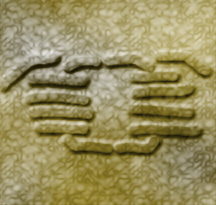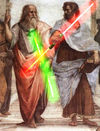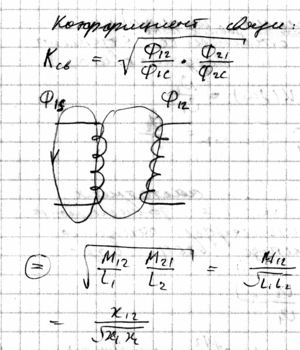Goa Tse

Goa Tse (寡啧 gua3 ze2, Pinyin: Guá Zě, Wade Giles: Koa Tze) was a Taoist monk in the line of Chuang Tse (Tzu), active in the Chinese province of Yuguanzi around 455 BC. Famous for writing an early I Ching lecture book, Goa Tse was to become a key figure within Chinese philosophical thinking, and although many of the tales surrounding him are more mythological than historical, a number of facts about his life have survived.[1]
Early life
Little is known of Goa Tse's early life. He first comes into prominence as a courtier during the reign of the Zhou Ophile Dynasty. China during the 4th Century BCE was a time of transition, with invaders from both the west and east forcing themselves upon the kingdom's territory. It was into this maelstrom of activity that the young Goa Tse began to expound a new approach to life. Whilst meditating on the First Noble Truth of the Buddha: "Existence is suffering", Goa Tse attempted the complicated Yoga maneuver "Rabbit digs the burrow", and discovered his personal path to enlightenment.
Expansion as a martial artform
| Philosophy |
|---|
 |
| Philosophers |
| Philosophies |
| Questions |
| Answers |
| Related |
Goa Tse realised the potential chi energy in his meditative practices could be harnessed and used for defence as well as meditation. Thus did he develop the martial art now known as Goa Tse Do or "Way of the Expanding Ring".
Goa Tse realised energy was needlessly wasted performing the complicated forms that traditional Kung Fu training focused on. He believed that just one manoeuvre, performed correctly, could prevent a confrontation before it occurred. For the next eight years, he meditated silently on the issue of how this ultimate move could be executed, all the while performing the stretching exercises that helped to purify his thoughts.
In his eighth year of meditation, Goa Tse was disturbed by bandits who came to raid his temple. As they approached, Goa Tse calmly walked out of the front gate, turned his back to them, and lifted his ceremonial robes. The bandits apparently laughed but for a second, until Goa Tse expanded himself to his fullest extent. The story has it that the bandit leader dropped dead on the spot, whilst the others recoiled in horror and rode off vomiting profusely as have many after him.
Few Goa Tse Do practitioners are thought to exist today; however, if you really want to go there, you could probably find a few of them on the Internet. But don't say we didn't warn you.
Goa Tse fortune telling methodology

Goa Tse's method for solving the fortune telling hexagram was to try to press down six coloured sticks into a narrow bottle. The number of sticks that broke told him the answer. Over time changes were incorporated into the system, first eight sticks, then ten sticks, then large projectile plugs, each having a specific meaning to the practitioner.
School of Wang
A number of schools of Goa Tse sprang up throughout Asia during the first centuries of the Current Era, but none have had as lasting an incontinent incomparable [1] effect upon the discipline as the School of Wang. Named after the Goa Tse Master Wang G'rth, the first was opened in Taiwang, and quickly spread throughout both China and the Indian Subcontinent. Soon openings to join the schools expanded, stretching from coast to canyon, enabling the study of Goa Tse to overtake Buddhism, Shinto and fascism as the main religion of Asia.
Influence on society
Goa Tse managed to have such an influence on modern society, that Stalin came up with the following quote regarding Goa Tse, "In Soviet Russia, Goa Tse YOU!!" This was shortly before the USSR indoctrinated the philosophy that the world now knows as Goatse.
The sacred symbol of Goa Tse's tremendous iconic power has seen much usage in art and graphic design, particularly book and magazine covers, and corporate logos.
Teh Innertubes
Testaments to Goa Tse are increasingly popular with the spread of wiki-based social networking sites such as Wikipedia, where members seeking other members post "userboxes" featuring popular adepts of Goa Tse Do. Indeed those of Conservapedia have preferred the Goa Tse style of martial art to their accustomed Christianity on at least one occasion.[2] Goatsewin's Law: "As the number of edits on a wiki page increases, the probability of a goa tse at the top approaches one."
Great works
Goa Tse is famed as the author of a number of key books detailing not only the Goa Tse branch of Taoism, but also aspects of other eastern paths, and a treatise on I Ching.
His surviving works include:
- 卡然特栋 Ka Ra Te Dong ("The Way of the Clenched Fist")
- Hung Wang ("Stretching Exercises for Tai Chi")
- Tai Ni Po Ni ("Parable of the Incompetent Horse")
- Sum Bum Fun ("Crouching Actress, Hidden Baseball Bat") [2]
- 损晕活 Sum Yung Ho ("Parable of a Delinquent Schoolgirl")
- 王坑我门 Wang Keng Wo Men ("Parable of the King")
- Ta He Po Dong ("The Way to Happiness")
Famous Goa Tse quotes

- The wider the Gate, the closer to Paradise.
- Just like the Sage who opens to the higher, Goa Tse opens his lower.
- The foundation for enlightenment is to ensure a good grounding.
- The foolish man remains closed and tight, the wise man stretches himself in every way.
- In the center, there is void.
- Enlightenment cannot be attained until the fourth eye is wide open.
- Small person, large receptacle.
- Open it, and it shall receive.
- Walk like crab, think like the wise.
- Those who open themselves shall receive many a compliment.
Extract from the Goa Tse Bible
Although the original Goa Tse Bible was buried by followers of Meatspinism who are morally opposed to Goa Tse's teachings, this extract remained embedded on the wall of the Goa Tse Temple:
THE HANDS REACHED DEEP WITHIN HIM
AND DID OPEN HIM WIDE
See also
Notes
^ 1. Accuracy of translation debated.
^ 2. Does someone who's stretched himself to that extent need incontinence pads day and night?
References
- ↑ "The Kentucky Derby is Decadent and Depraved", Hunter S. Thompson.
- ↑ http://rationalwiki.com/wiki/Goatse#Examples_of_Goatse_in_action
- ↑ Wicked Bible, Deuteronomy 5:24. Probably a translation error.
- Philosophy
- China
- Internets
- Chinese historical figures
- Philosophers
- Goatseisms
- Internet memes
- Internet Legends
- Intentionally Offensive
- Uncyclopedia In-Jokes
- Pages With Many Categories
- Hybrid subjects
- Puns
- Biographies of Ridiculous Persons
- Innuendo
- Ass
- Holes
- Assholes
- Shocking
- Causes of COVID-19
- Fates worse than death
- Things that are definitely out to get you
- Things banned by the Geneva convention
- Once you've seen it, you can't unsee it
- Not safe for kids
- Not safe for work
- (Really) Not (Fucking) Safe For Work
- AGH MY EYES
- Ew
- FA Internet
- FA Sex
- FA Philosophy
- FA China
- FA Uncyclopedia In-Jokes
- Featured


